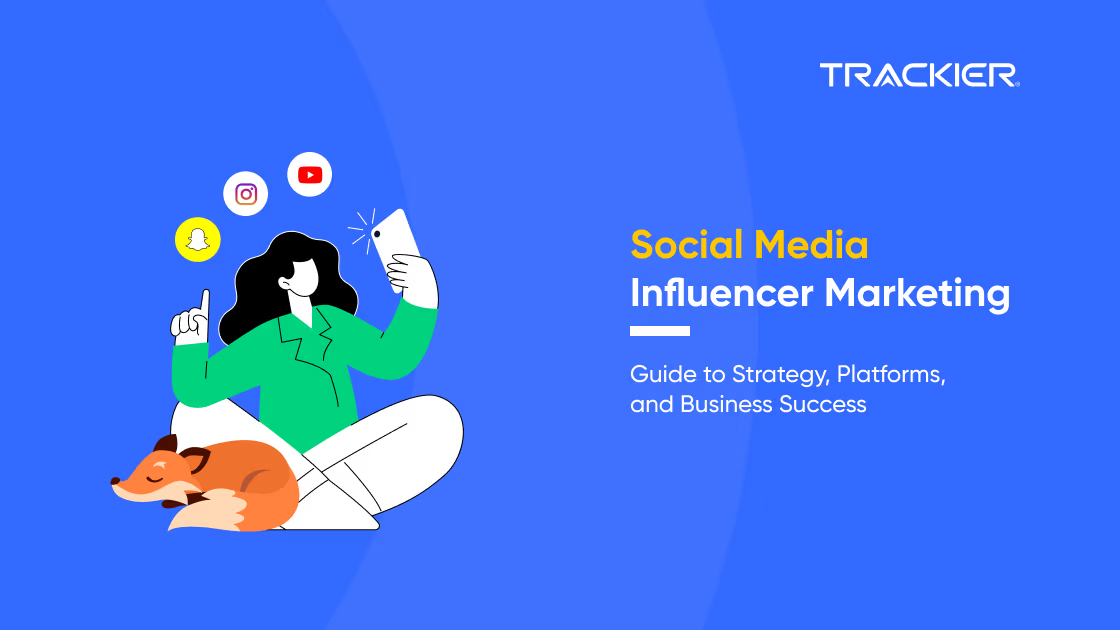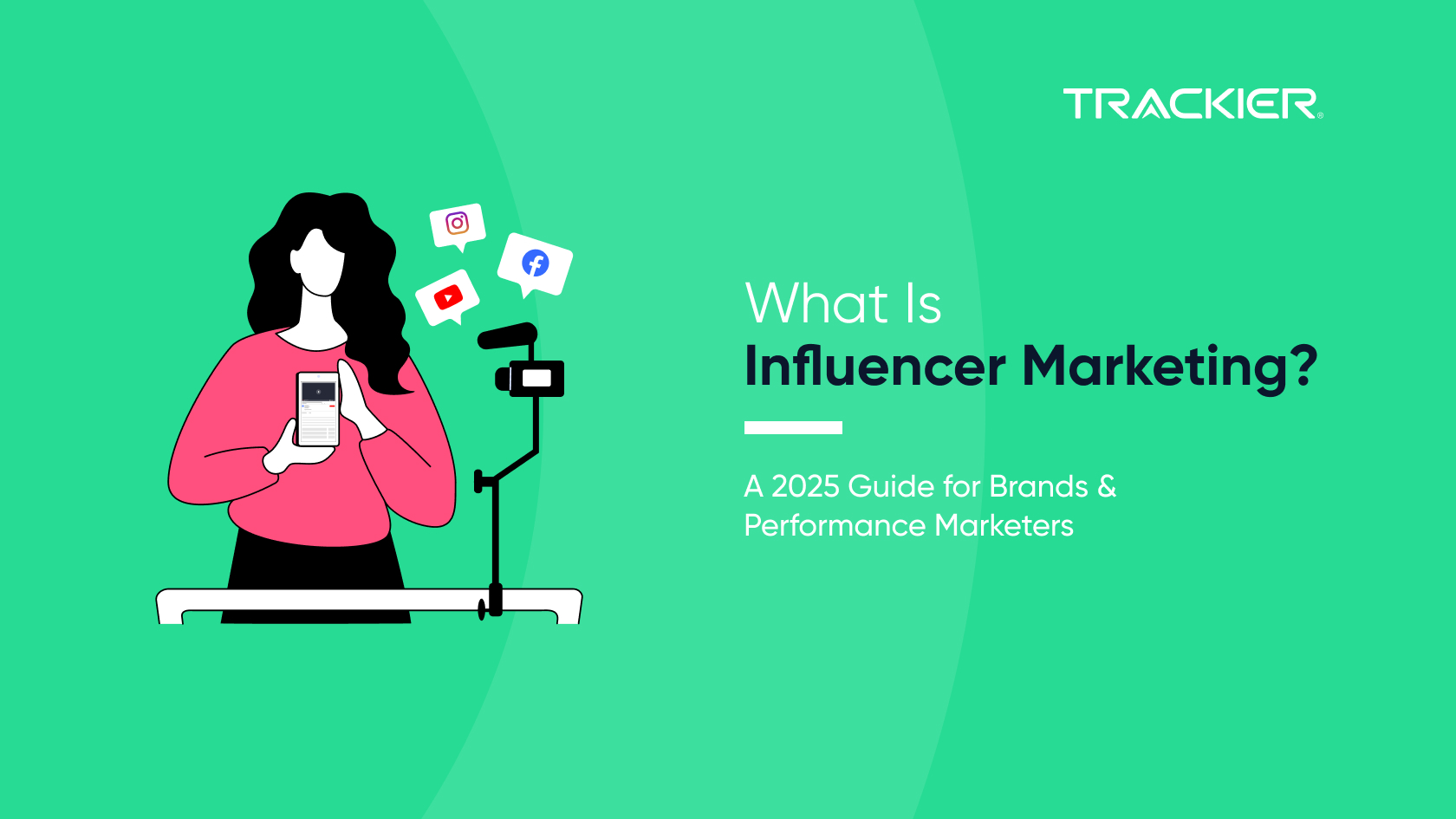Social media influencer marketing has changed the way brands connect with their consumers. As per the latest 2025 report, influencer marketing will reach $32.55 billion, which is a substantial increase from 2024.
Unlike traditional advertising, influencers build trust with followers on Instagram, TikTok, and YouTube, creating genuine connections that drive real results.
However, brands need a performance marketing software like Trackier to measure their campaign performance, streamline partnerships, and maximize the ROI.
What is Social Media Influencer Marketing?
Social media influencer marketing focuses on leveraging influencers to promote a brand’s product or service on different social media platforms.
An influencer is an individual who has followers on social media platforms and holds a certain level of authority or trust within a particular niche.
Influencers can range from mega celebrities with millions of followers to micro-influencers with fewer followers but a highly engaged audience in a particular niche.
Influencer Marketing vs Social Media Marketing
It is important to differentiate between influencer marketing and social media marketing because they serve different purposes and use different strategies.
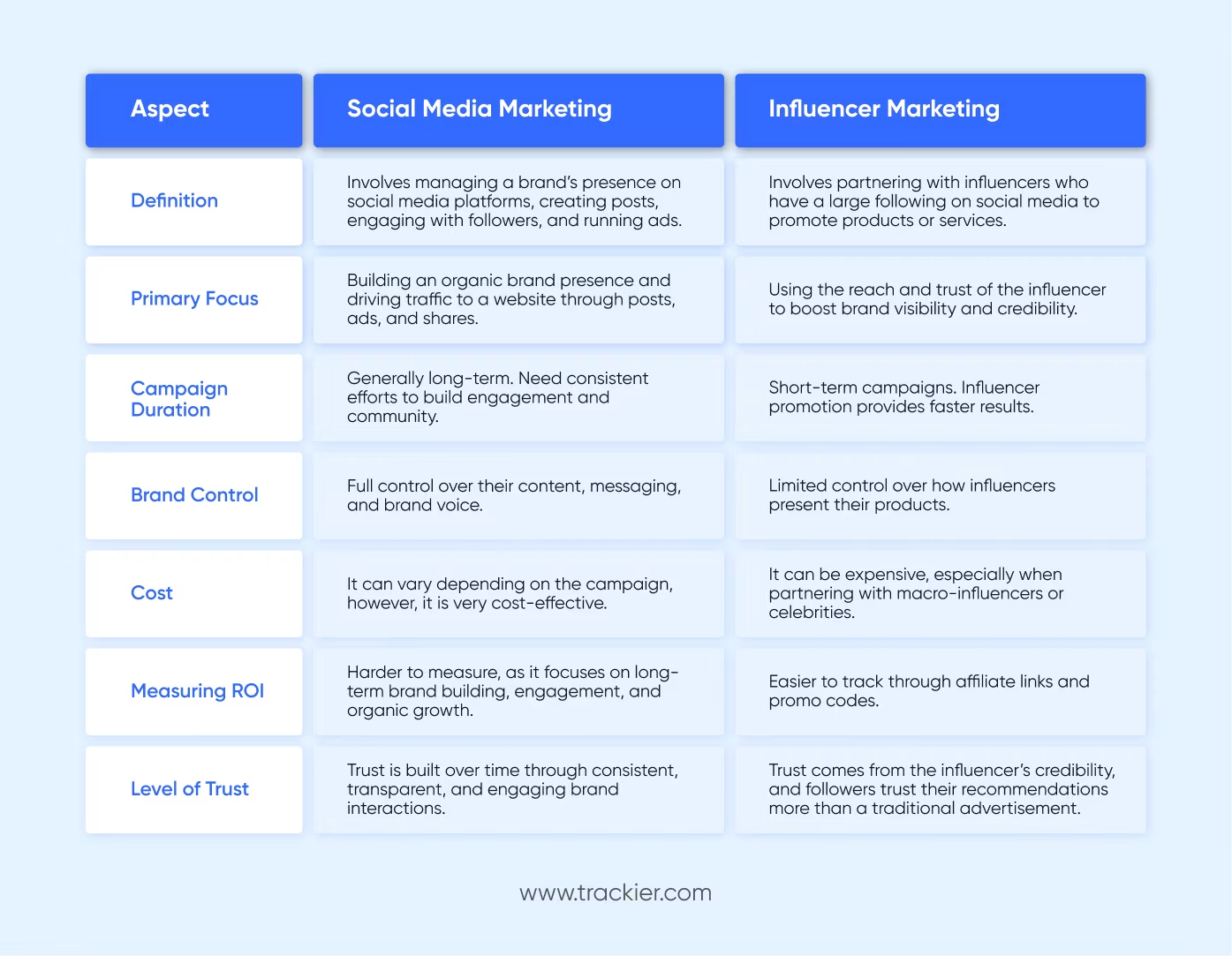
Which is the Best Social Media Influencer Marketing Platform?
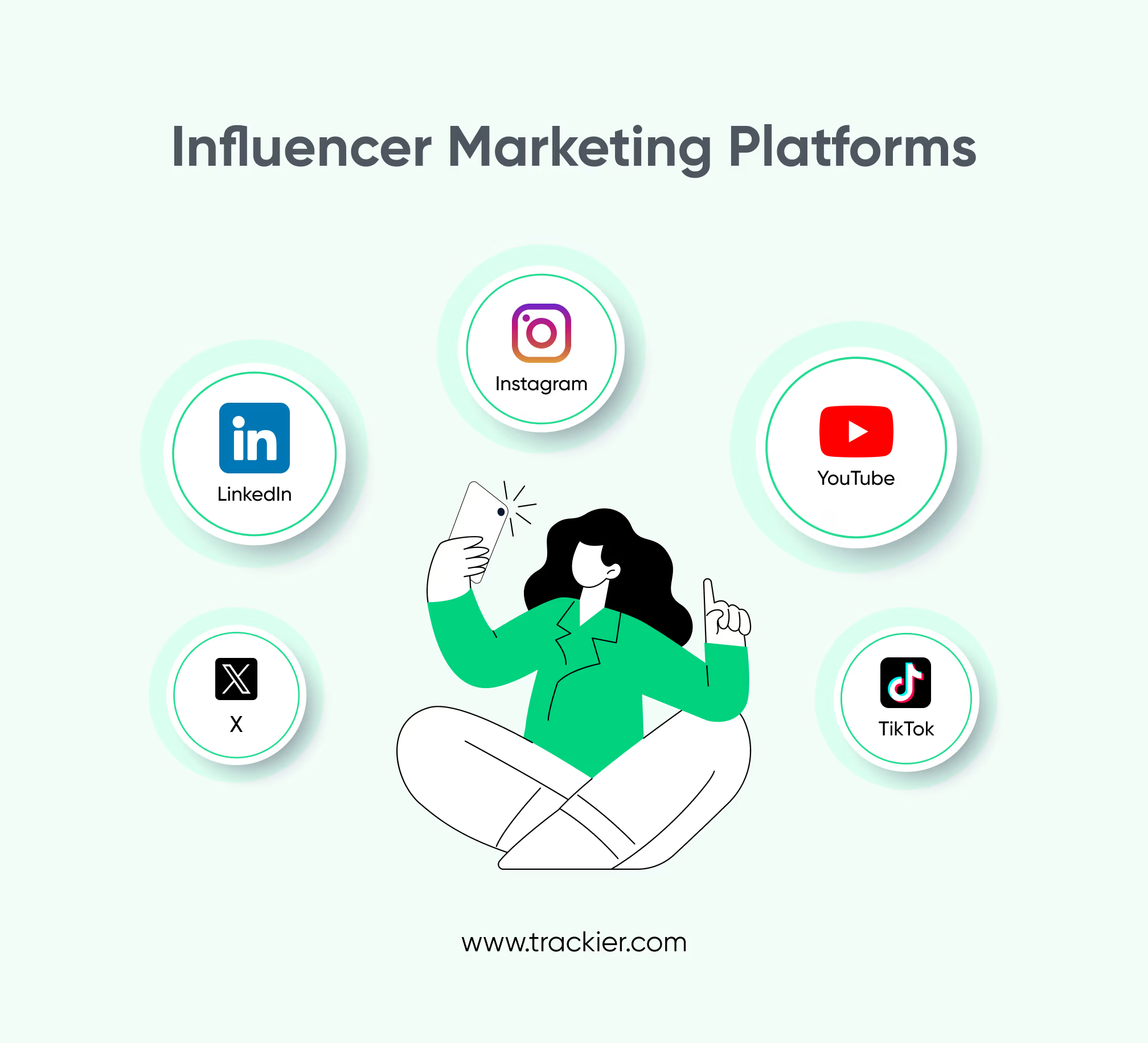
Choosing the right platform for your influencer marketing campaigns is necessary. Each platform offers a unique audience, content style, algorithm, and strengths. Here are the top 5 platforms widely used for social media influencer marketing:
1. Instagram
Instagram is one of the most popular platforms for influencer marketing, specifically in the categories of fashion, beauty, lifestyle, and travel.
Influencers use this platform to promote a brand’s product or service in a creative way, like through stories, posts, or sponsored content.
After a game-changing feature called “Instagram Shopping”, influencers can even tag different products in their posts, which makes it easier for their followers to purchase them.
2. TikTok
TikTok has quickly become one of the most engaging social media platforms for influencer marketing. Its algorithm loves short-form, engaging, and viral content, which makes it the best option for influencer collaborations.
It is also one of the best platforms for targeting the Gen Z audience on TikTok, which is known for its creativity, and many brands collaborate with them for viral challenges, trends, and hashtag campaigns.
3. YouTube
YouTube is still one of the best platforms for influencer marketing for various brands, including technology, gaming, health, fitness, etc.
YouTube influencers usually produce long-form content like product reviews, tutorials, unboxing videos, and vlogs, which provide in-depth insights into a product or service.
4. X
While not visually appealing platforms like Instagram or TikTok, X is still an effective platform for influencer marketing when it comes to thought leadership and real-time engagement.
Every influencer builds a following around their expertise in a specific niche like technology, politics, or sports.
Many influencers on X can drive conversations and create a buzz for your brand by sharing links, opinions, and using relevant hashtags.
5. LinkedIn
LinkedIn may not be the 1st platform that you think of for influencer marketing. But, it is the best platform for B2B brands for targeting professionals and top influential individuals like CEO, CTOs, CMOs, etc.
Specific industries like finance or SaaS can create content that resonates with their professional network, which makes it an excellent platform for B2B brands.
Track, Manage & Optimize Influencer Campaigns: Book Demo!How to Leverage Influencer Marketing for Business Success?
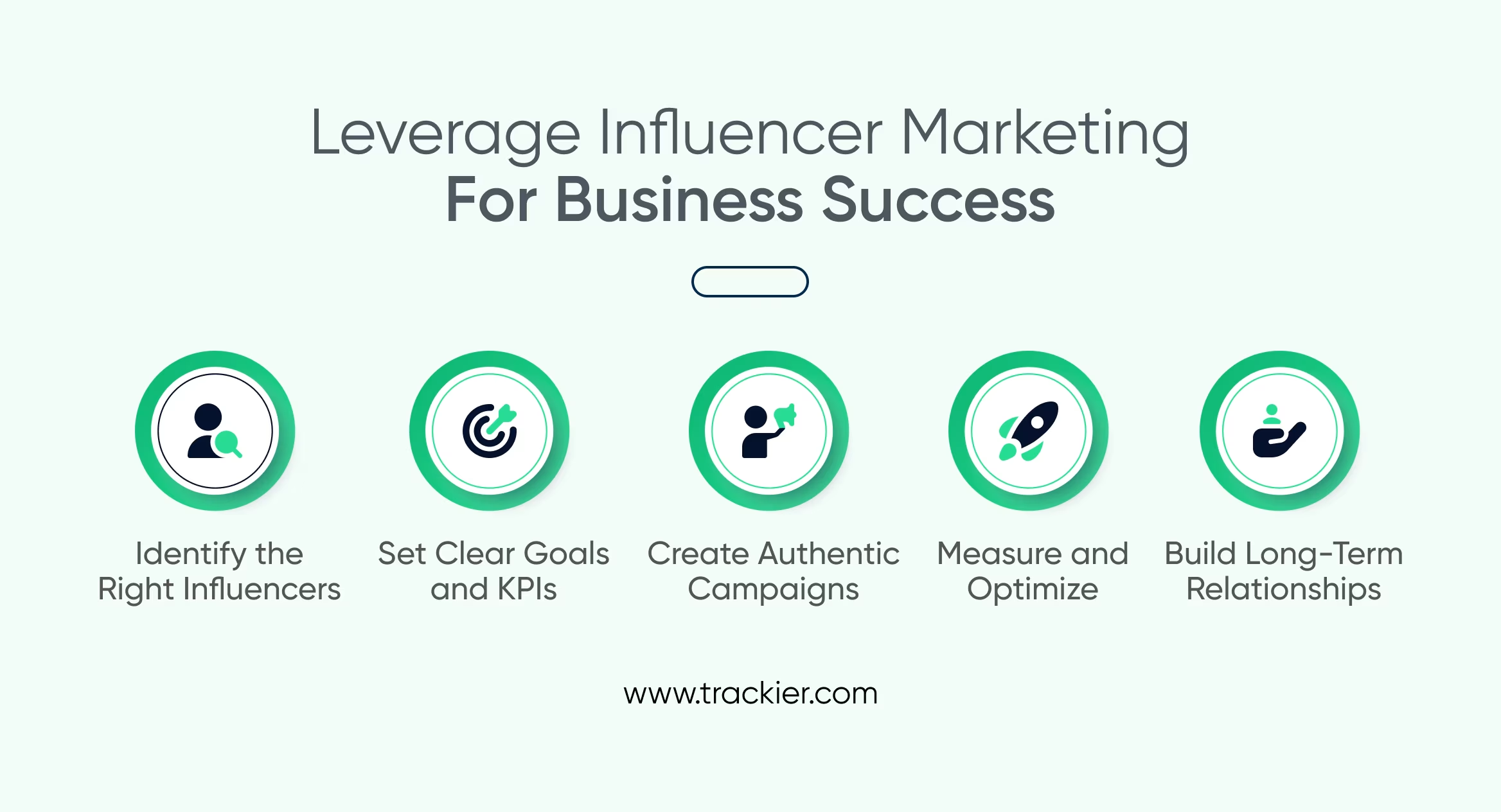
Influencer marketing can deliver the best results if done right. To ensure your campaigns are successful and drive long-term value, follow these simple steps:
1. Identify the Right Influencers
Before choosing any influencer, consider some important factors such as their niche, audience demographics, engagement rate, and values.
Also, look for influencers whose followers align with your target audience, and ensure that their content and personality fit your brand’s image.
Brands can leverage performance marketing software for identifying and collaborating with the right influencers by providing analytics and tools to monitor their performance.
2. Set Clear Goals and KPIs
Like any other marketing strategy, influencer marketing needs clear goals and KPIs to measure success. Whether you want to increase brand awareness, drive website traffic, or boost sales, it is important to set measurable goals.
Also track some other metrics like reach, engagement, and conversion rates to identify the effectiveness of your campaign.
3. Create Authentic Campaigns
Influencers have so many followers because they produce authentic and relatable content for their audience. So, allow your influencer creative freedom to promote your products or services in their own voice and style.
Their followers trust them because of their genuine content; overly scripted content can negatively impact your brand’s image. So, for better engagement and credibility, co-creating will be helpful.
4. Measure and Optimize
Once your campaign is live, it is important to continuously monitor its performance. Use a performance marketing software to track reach, engagement, clicks, and conversions.
Identify what is working and what is not. If a specific influencer or content format performs better, follow that approach for better results.
5. Build Long-Term Relationships
Influencer marketing is not just a one-time thing. You need influencers to promote your brand’s awareness, build brand trust, and long-term audience loyalty.
Consistent collaboration allows influencers to stick with your brand for a longer period of time to drive more authentic endorsements and better results over time.
Conclusion
In conclusion, social media influencer marketing is an effective strategy that helps brands to build trust, increase engagement, and drive sales by partnering with influencers.
To achieve your goal, understand the difference between influencer marketing and social media marketing. Also, choose the right platform and influencer that can significantly impact your campaign performance.
Leverage a performance marketing software like Trackier that helps brands to identify top influencers, monitor campaigns, prevent fraud, right attribution, and maximize the results.
FAQs
1. Why does influencer marketing work?
Influencer marketing is effective since audiences trust influencers’ opinions more than a brand’s advertisement. It generates high engagement, builds brand trust, and increases conversions by leveraging the influencer’s engaged and niche community across social media platforms like Instagram, YouTube, or TikTok.
2. How do you know which influencer to choose?
You want to ensure the influencer has an audience similar to your target audience. When choosing an influencer, you should look at their average engagement, content quality, authenticity, and campaigns in which they have partnered with a brand in the past. Micro-influencer audiences tend to be more loyal and offer a higher engagement rate, while macro-influencers offer more reach.
3. What platforms are best for influencer marketing?
Influencer marketing tends to take place on Instagram, YouTube, and TikTok since they are visual in nature and have large audiences. Instagram is best for product promotion, TikTok is best for short viral content, and YouTube is best for in-depth reviews or tutorials.
4. What is the difference between a micro influencer and a macro influencer?
Micro influencers generally are defined as influencers with followers ranging from 10K to–100K. Micro influencers are recognized for their high engagement and niche content, while macro influencers have more than 100K followers, which means they will have a broader reach. Decide between a micro and macro influencer, depending on your campaign goals–reach, engagement, or niche.
5. How do I measure success in influencer marketing?
When evaluating influencer marketing, use appropriate metrics to assess campaign effectiveness. Metrics to evaluate follow engagement rate, reach, click through, and conversion rate to assess traffic and sales from influencer content. Influencer marketing success can also be measured with ROI. It is also important to measure qualitative insights like sentiment and brand mentions.
6. Is influencer marketing for everyone?
Absolutely! Influencer marketing is effective for almost all types of industries; we see it everywhere, from beauty and fashion to business and tech. The key to success is choosing the right influencers and establishing goals. Even small businesses can utilize influencer marketing by partnering with micro influencers in their niche.
